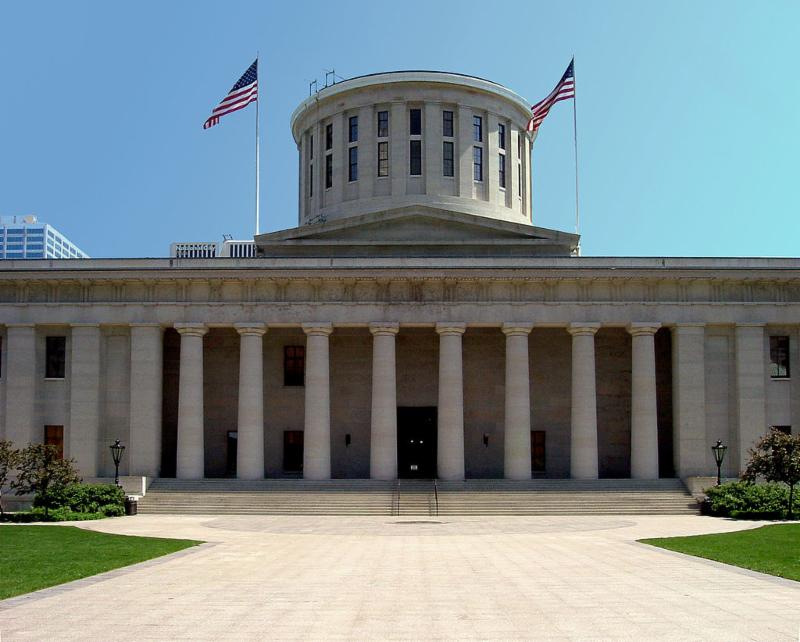American Association of University Professors
News & Blog
04.17.19
Statehouse News: McNay, Voigt Testify on Budget, Free Speech
HB 166: State Budget Bill

Last Thursday, April 11, OCAAUP President John McNay testified to the Ohio House Finance Subcommittee on Higher Education on House Bill 166, the biennial state budget bill.
In his testimony, McNay advocated for greater State Share of Instruction funding, encouraging the committee members to seek new revenue, if need be, in order to accomplish that. He applauded the infusion of money to the need-based Ohio College Opportunity Grant, but advised that the state still can — and should — do better.
In addition, McNay called attention to issues with College Credit Plus and the focus on “time to degree” as a cost-savings model. He also said institutions need to be more transparent with their budgets, since too much money is being spent on things peripheral to the academic mission.
Moreover, he suggested that the Ohio Department of Higher Education (ODHE) needs to have greater oversight of university leadership, since several of Ohio’s institutions have been mismanaged badly.
McNay pointed to this language in the budget regarding faculty workload, which we brought to your attention last week:
The boards of trustees of state institutions of higher education shall ensure that faculty members devote a proper and judicious part of their work week to the actual instruction of students. Total class credit hours of production per academic term per full-time faculty member is expected to meet the standards set forth in the budget data submitted by the Chancellor of Higher Education.
ODHE reached out to us last week to let us know that this language merely carried over from previous budget bills and has no discernible impact, so McNay asked the committee to remove the language to avoid further confusion.
HB 88: FORUM Act / “Campus Free Speech”
Last Tuesday, April 9, Ohio State professor and OCAAUP member Lisa Voigt testified on House Bill 88, the “Forming Open and Robust University Minds” or FORUM Act, also called the “Campus Free Speech” bill.
Calling the bill unnecessary, Voigt stated in her testimony that the First Amendment already protects free speech at our colleges and universities, and that, while the AAUP shares the belief that no idea should be banned on campus, there is a difference between forbidding an idea and hosting a controversial speaker that could require heavy security.
Voigt also warned that, should this bill become law, it would lead to more bureaucracy and administration at our institutions.
We plan to testify against SB 40, which is the companion bill to HB 88 in the Ohio Senate, when that opportunity arises.
Many thanks to Professors McNay and Voigt for representing faculty in our state capital to relay the AAUP’s concerns and positions.
Action Alert: Campus “Free Speech” Bills

If you haven’t already, please send messages to your state legislators asking them to reject these so-called “campus free speech” bills. More information and a link to easily contact your representative and senator below.
House Bill 88 and Senate Bill 40, both known as the “Forming Open and Robust University Minds” or FORUM Act are taken straight from the American Legislative Exchange Council (ALEC) and Goldwater Institute model legislation playbooks.
Both bills would prohibit colleges and universities from having free speech zones, as well as force institutions to host any speaker that is invited to campus. It would allow anyone from the campus community or an invited speaker to sue the university for up to a year after what they feel was a free speech violation.
In addition, these bills would require institutions to widely publish free speech policies, make them part of student orientations, and make institutions report to the state the enforcement of these provisions and any violations of them.
HB 88 also would require institutions to adopt the following definition of “harassment:”
1. Conduct by an employee that requires an individual to submit to unwelcome activity in order to receive aid, benefit, or service; or
2. Unwelcome conduct that is so severe, pervasive, and objectively offensive that it effectively denies an individual equal access to the individual’s education program or activity.
As we expressed in letters to members of the committees hearing these bills, the legislation is not necessary, as our institutions of higher education have done well balancing First Amendment interests with the safety and welfare of the campus community.
In addition, we believe these bills could make our institutions even more likely to become involved in highly politicized controversies, and are potentially very costly–neither of which is what our students and the taxpayers can possibly want our institutions to be distracted by or expending resources on.
Summer AAUP Conferences
The National AAUP has two important events this summer: the Annual Conference and Summer Institute.

The Annual Conference is being held in Crystal City (just outside of Washington, DC) from June 12 through June 16. National AAUP is proposing major restructuring changes that will need to be approved by the membership.
In addition, this year’s Summer Institute — a series of workshops and trainings designed to empower faculty — will be held at Roosevelt University in Chicago from July 25 to July 28. A limited number of scholarships are being offered by OCAAUP to cover the registration (which includes lodging and most meals) and travel expenses. If you are interested in a scholarship, please e-mail sara@ocaaup.org.